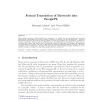Free Online Productivity Tools
i2Speak
i2Symbol
i2OCR
iTex2Img
iWeb2Print
iWeb2Shot
i2Type
iPdf2Split
iPdf2Merge
i2Bopomofo
i2Arabic
i2Style
i2Image
i2PDF
iLatex2Rtf
Sci2ools
116
click to vote
ENTCS
2007
2007
Formal Translation of Bytecode into BoogiePL
Many modern program verifiers translate the program to be verified and its specification into a simple intermediate representation and then compute verification conditions on this representation. Using an intermediate language improves the interoperability of tools and facilitates the computation of small verification conditions. Even though the translation into an intermediate representation is critical for the soundness of a verifier, this step has not been formally verified. In this paper, we formalize the translation of a small subset of Java bytecode into an imperative intermediate language similar to BoogiePL. We prove soundness of the translation by showing that each bytecode method whose BoogiePL translation can be verified, can also be verified in a logic that operates directly on bytecode.
| Added | 13 Dec 2010 |
| Updated | 13 Dec 2010 |
| Type | Journal |
| Year | 2007 |
| Where | ENTCS |
| Authors | Hermann Lehner, Peter Müller |
Comments (0)

